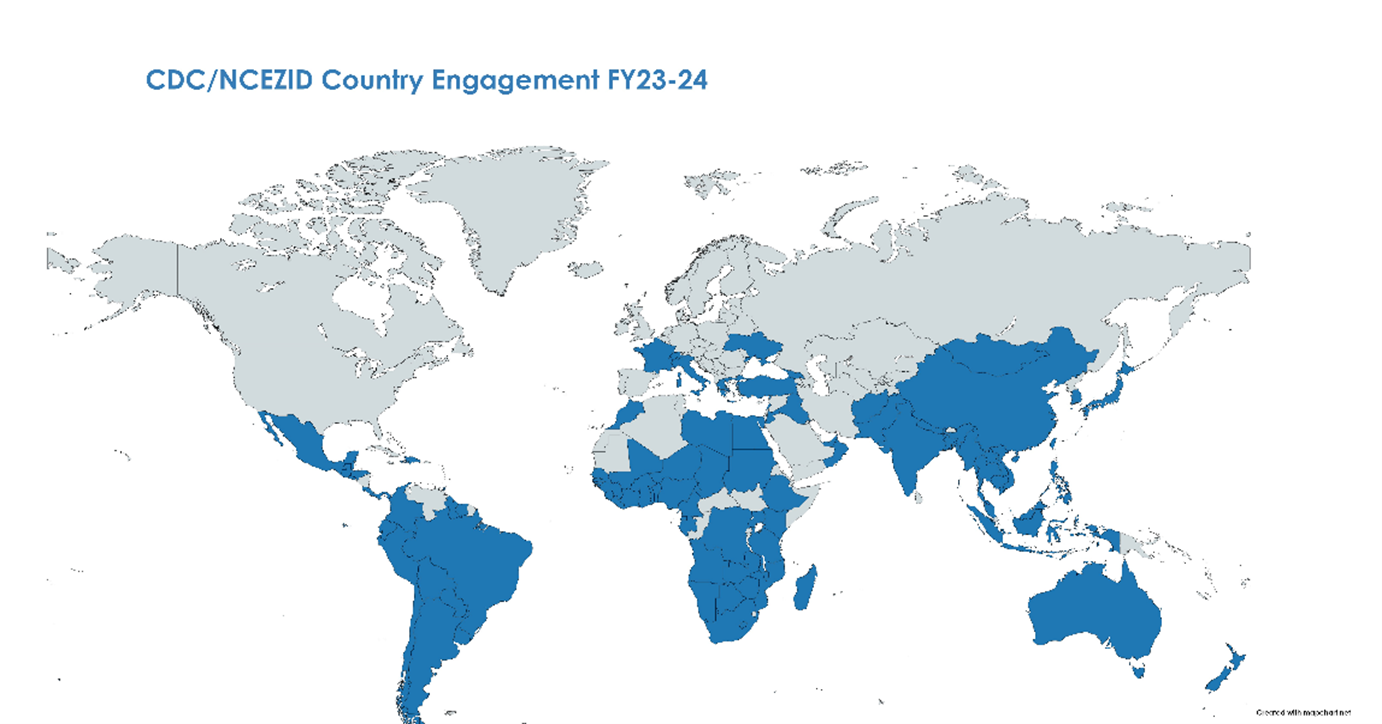At a glance
NCEZID's Global Health Vision is to equitably protect the United States and global populations from infectious disease threats in support of CDC's mission.

Overview
In this highly connected world, emerging and zoonotic (diseases spread between people and animals) infectious diseases are a growing threat in the United States and globally. The number of outbreaks is increasing, the spread of disease is accelerating, and the associated morbidity and mortality are rising.
NCEZID infectious disease and laboratory experts are at the forefront of critical global health security efforts. We provide leadership in international disease prevention, identification, control, and elimination; advance research and science; and build collaborations with international stakeholders, including bilateral and multilateral partners from multiple sectors.
NCEZID's Global Work
NCEZID's global programs:
- Provide leadership in disease identification, control, and outbreak response.
- Use a One Health approach, partnering with public health, animal health (agriculture & wildlife), environment, and other relevant sectors when addressing global public health threats.
- Serve as subject matter experts, advancing innovation, research, and science.
- Develop networks and systems that can be leveraged for outbreaks of pandemic potential.
- Advance mitigation strategies.
- Train workforce to detect and respond.
- Build collaborations with international partners and serve in key global leadership positions.
Global Health Priorities
NCEZID works across CDC to address emerging and zoonotic infectious diseases using the CDC Global Health Strategic Framework to ensure a unified approach to achieving these goals. NCEZID identified global health priorities within emerging and zoonotic infectious diseases for 2023-2026. Priorities include:
- High-priority threats (viral hemorrhagic fevers, monkeypox)
- Vector-borne diseases (yellow fever, dengue)
- Parasitic diseases (malaria, neglected tropical diseases)
- Antimicrobial resistance and infection prevention and control
- Migration and travel health and border health
- Global water, sanitation, and hygiene, global waterborne infections, and global foodborne diseases (WASH, cholera)
- Enhancing surveillance and detection of emerging infections through pathogen-agnostic methodologies (PusleNet International, wastewater and environmental surveillance, MicrobeNet International, advanced molecular detection)
- Additional threats (rabies, fungal diseases, anthrax, melioidosis, Rocky Mountain spotted fever)
NCEZID’s Global Health Priorities describe goals and measurable outcomes for global programs for the next 1-3 years with a focus on using a One Health approach to build capacity to prevent, detect and respond to the next outbreak.
Collectively, work on these priority areas deepens scientific understanding of infectious diseases; builds multisectoral pathogen specific and broad pathogen agnostic public health capacity to detect, prevent, and respond to outbreaks; and provides flexibility to address urgent public health needs as they arise.

NCEZID’s Global Health Office
NCEZID's Global Health Office was established in 2023 and is dedicated to the coordination of the Center's global programs and activities, while ensuring a unified approach to executing NCEZID's global health work. The office provides strategic oversight and coordination for the global portfolios of seven divisions and two offices.

